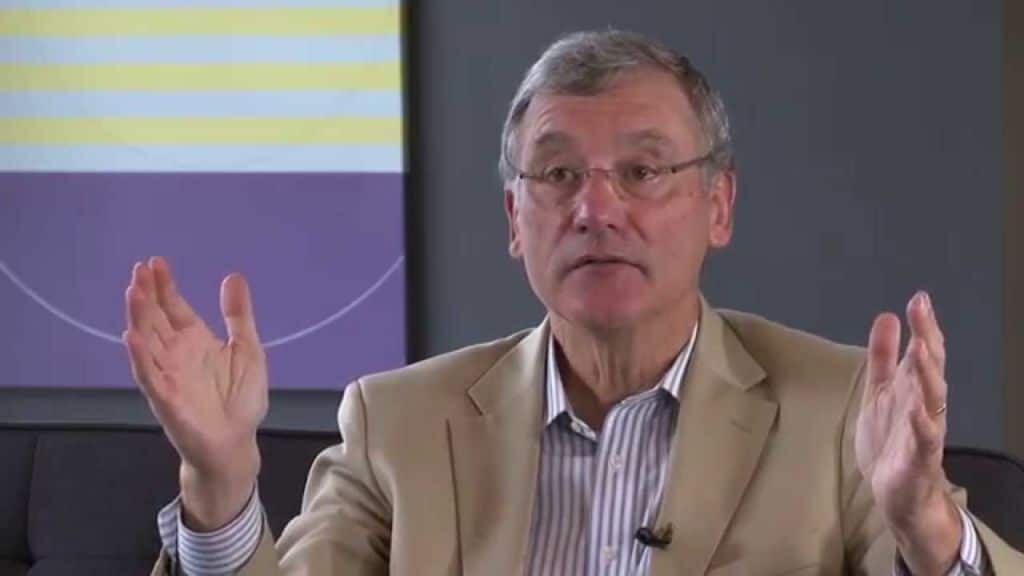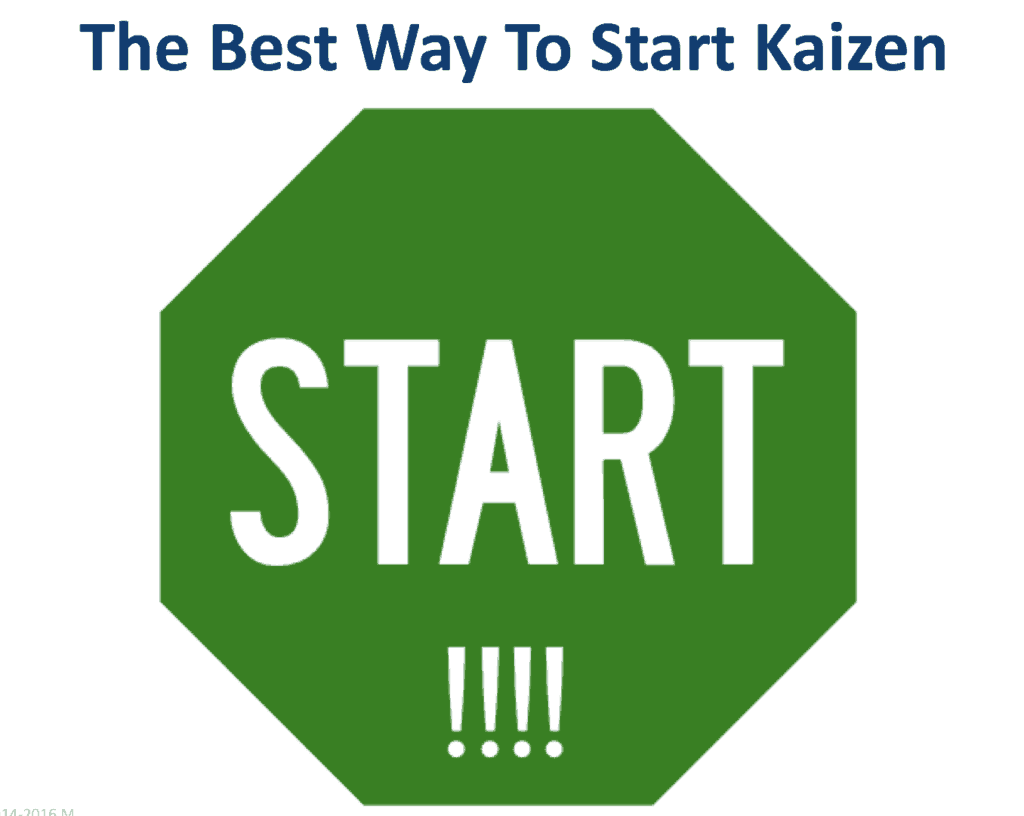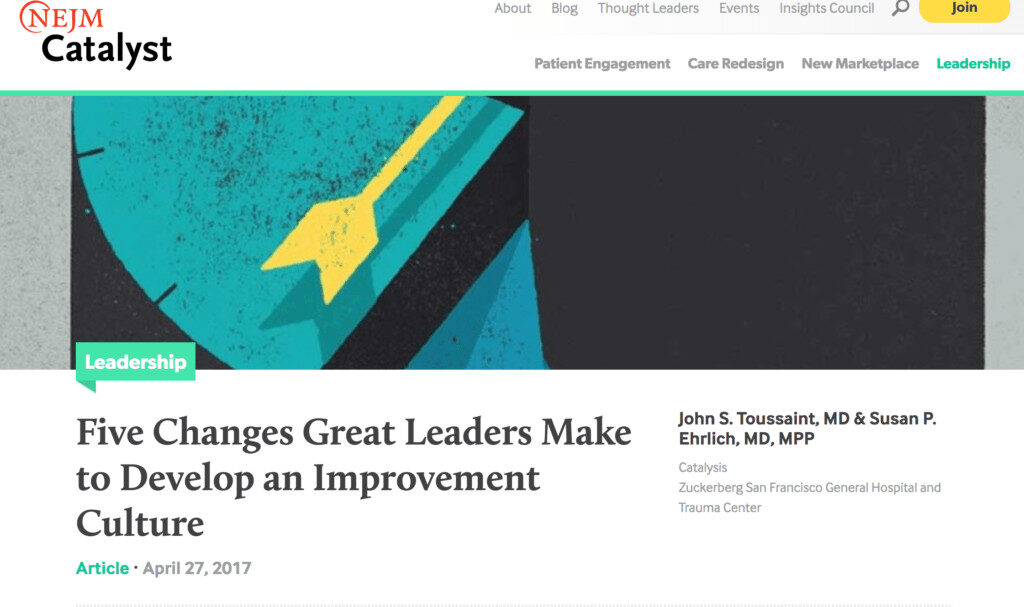
How big is the opportunity for improvement in healthcare? As Dr. Toussaint's hand gesture, above, indicates… it's a huge opportunity. There's a huge need.
What's the best way to improve during increasingly challenging and uncertain times? Engage everybody in improving and redesigning care!
Dr. John Toussaint, former CEO of ThedaCare and current CEO of the non-profit Catalysis (formerly the ThedaCare Center for Healthcare Value) is presenting a free webinar on June 22:
Information provided by Catalysis:
Five Changes Great Healthcare Leaders Make to Develop an Improvement Culture
In this 60-minute webinar, John Toussaint, MD. and CEO of Catalysis, will describe his experience helping healthcare leaders focus on the five personal behavioral dimensions that lead to outstanding organizational results. Dr. Toussaint will present data as to why these behavioral dimensions are so important and then focus on specific examples of excellence from St. Mary's General Hospital in Kitchener, Ontario; UMass Memorial Health Care in Worcester; and Zuckerberg San Francisco General Hospital.
Webinar highlights:
- Their work with 40 CEOs in North America on the five dimensions
- An easy-to-use system of self-rating
- Videos of healthcare leaders who have made fundamental changes in how they act with these behaviors as the starting point
- Interactive Q and A
Prior to the event, please read an article written on this subject. This article appeared at the online NEJM Catalyst on April 27, 2017.
Registration Link: http://bit.ly/2tcAXNc
Here's the article link, again, and I'll share some thoughts on it below…
What are their five qualities that great leaders need, according to John and his co-author Susan P. Erlich, MD, MPP, the CEO of the Zuckerberg San Francisco General Hospital and Trauma Center?
The qualities and “reinforcing behaviors” in parentheses:
- Willingness (Reflection)
- Humility (Go see)
- Curiosity (Asking effective questions, active listening, A3 thinking)
- Perseverance (Buddy system, have a coach)
- Self-discipline (Leader standard work)
They share the belief that I stated earlier in the post about engaging everybody:
“To adapt, and survive, organizations must take advantage of every bit of institutional talent. But this can happen only if leaders first embrace the need to change.”
They add thoughts I agree with from my own experience and observation:
“Becoming a continuous improvement leader takes coaching and plenty of practice. Participants become better leaders by “acting their way into thinking…”
This isn't something you just “learn” in a definitive sense from reading a book or taking a class. There's an important model of Learning then Doing, which prompts Learning through reflection and coaching… then more Doing, etc. As I've said, the best way to start building that culture of improvement is to just START.
I've used this image before:

Back to the article, “willingness” seems similar to the leader behavior that Joe Swartz and I shared in Healthcare Kaizen — that the first step for leaders is to express a belief in Kaizen… the belief that everybody can and should bring ideas forward and participate in improvement.
But, Toussaint and Erlich make a good point that we also tried to make… engaging everybody in improvement doesn't mean dumping responsibility on staff. Leaders are still responsible for the system. They need to set direction, but leaders need to stop giving solutions from on high.
“We as health care leaders must assume responsibility for poor patient outcomes, as well as staff and physician burnout…”
Leaders can share responsibility for fixing things with their employees and leaders at all levels.
On, humility, I see this as the difference between knowing the answer and finding the answer through inquisitive, experimental processes. The behaviors of “going to see” (instead of having answers in the board room) and then asking questions instead of telling… that's key.
We have to be careful to ask open ended questions and not disguise directives as questions.
“Leaders should therefore proactively examine their interactions with others and ask themselves, Did I ask questions that elicited the best thinking of the person or team with whom I interacted? Were there implied answers in my questions?”
Leading with humility is such an important idea at Toyota, that it's a main focus of Chapter 1 of the book Toyota by Toyota as I blogged about:
Through curiosity, as Toussaint and Erlich write, we can unleash the creativity of everybody in our workplace.
And perseverance means that we don't give up or quit these new behaviors the first time things get difficult. Things get harder before they get easier, when we're learning new habits and when we're trying to practice them.
The article also includes a case study from ZSFGH… check it out!
And don't forget to register for the webinar. I'm really looking forward to it. John shared some of these concepts in his keynote talk last week (see my notes here), but I think you'll want to hear him discuss it live.
What do you think? Please scroll down (or click) to post a comment. Or please share the post with your thoughts on LinkedIn – and follow me or connect with me there.
Did you like this post? Make sure you don't miss a post or podcast — Subscribe to get notified about posts via email daily or weekly.
Check out my latest book, The Mistakes That Make Us: Cultivating a Culture of Learning and Innovation:










